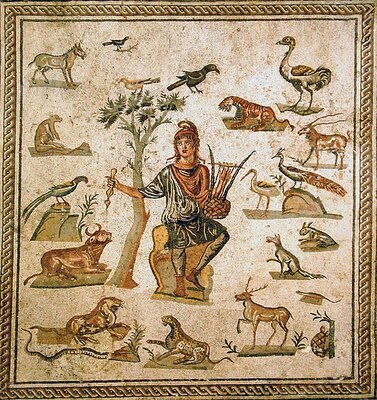
| Norse | Slavic | Latin | Greeks | Ægyptian | Persian | Assyrian | Indian | Chinese |
|---|---|---|---|---|---|---|---|---|
| id. | Chaos | Hun-tun(?) | ||||||
| id. | Erebus | |||||||
| Nox | Nyx | |||||||
| Ether | Æthér | |||||||
| Zorja(?) | Dies | Hémera | ||||||
| Cælus | Uranus | Nut | Anu | Dyaus(?) | Tien(?) | |||
| Jord | Tellus | Gæa | Urash/Ci | Bhumi(?) | ||||
| id. | Óceanus | Apasón(?) | ||||||
| ed. | Téthys | Thalatté | ||||||
| Njord(?) | Saturn | Cronus | Ceb | Zervan | Ninurtu | |||
| Ops | Rhea | |||||||
| Latona | Létó | Butó | ||||||
| Freya | Venus | Aphrodite | Hathór | Anaïtis | Ishtar/Inanna | |||
| Vesta | Hestia | — | ||||||
| Ceres | Demétér | Isis | ||||||
| Juno | Héra | — | ||||||
| Veles(?) | Dis | Hadés | Amenthés | Arímanius | ||||
| Neptune | Posídón | — | ||||||
| Thunar | Perun | Jupiter | Zeus | Ammón | Hóromasés | Bel/Elil | Indra(?) | |
| Minerva | Athéna | Néith | ||||||
| Sunna | Dažbog(?) | Sol | Apolló | Hórus | Mithras | Shamash/Utu | ||
| Mani | Diana | Artemis | Bubastis | Mah(?) | Sin/Nanna | |||
| Tyr | Mars | Arés | Onuris | Nirgal | ||||
| Svarog | Vulcan | Héphæstus | Phtha | Ao/Enci | Agni(?) | |||
| Wodan | Mercury | Hermés | Theuth | Nebo | Tsang-chieh(?) | |||
| Proserpina | Persephoné | |||||||
| Liber | Dionysus | Osiris | Pan-ku(?) | |||||
| Hercules | Héraclés | Su | ||||||
| Vediovis | Asclépius | Imythés |
Venus is the god of the Hagarenes (Moslems), which they called Chabar & Alilat. The fragments of the head of her idol are embed in the black stone at Mecca. Previously, the Arabs worshipped her with Aluzza & Manat.
Bacchus, as Sabazius, is identified by some as the god of the Jews.
Dies is identified with Aurora, and, as Hemera, with Éós.
Dis (& as Hades) is also called Plutó.
Jupiter is also called Jove, and as Zeus, Dias.
Sol (& as Apollo) is also called Phœbus.
Gæa is also called Gé.
Persephone is also called Coré, & identified with Praxidicé.
Liber (& as Dionysus) is also called Bacchus, & identified with Æon, Zargeus, Sabazius, &, by some, Phanés & Ericepæus.
Osiris is also called Serapis.
Tethys is identified with Thalassa.
Athena is identified, by some, with Anaïtis.
Hermes is identified, by some, with Anubis.
Ishtar is also called Astarté & Mylitta.
The traditional titles of the wise men of each nation are:
| Celtic | Greek | Ægyptian | Persian | Assyrian | Indian |
|---|---|---|---|---|---|
| Druids | Sages | Prophets | Magi | Chaldæans | Brachmins |
| Samaneans |
Magi are those now called Zoastrians. Brachmins may be those now called Hindus, and Samaneans may be those now called Buddhists.
References
- John of Damascus, St. “On Heresies” in: The Fount of Knowledge.
- Sysoev, Daniel, St. A Chronicle of the Beginning
- Nestor the Chronicler, St. Tale of Bygone Years
- Malalas, John. Chronicle
- Herodotus. Histories.
- Plutarch. “On Isis and Osiris” in: Moralia.
- Damascius. Difficulties and Solutions of First Principles.
- Iamblichus. The Theology of Arithmetic.
- Strabo. Geography.
- Porphyry. On Abstinence from Animal Food.
- Plato. Timæus.